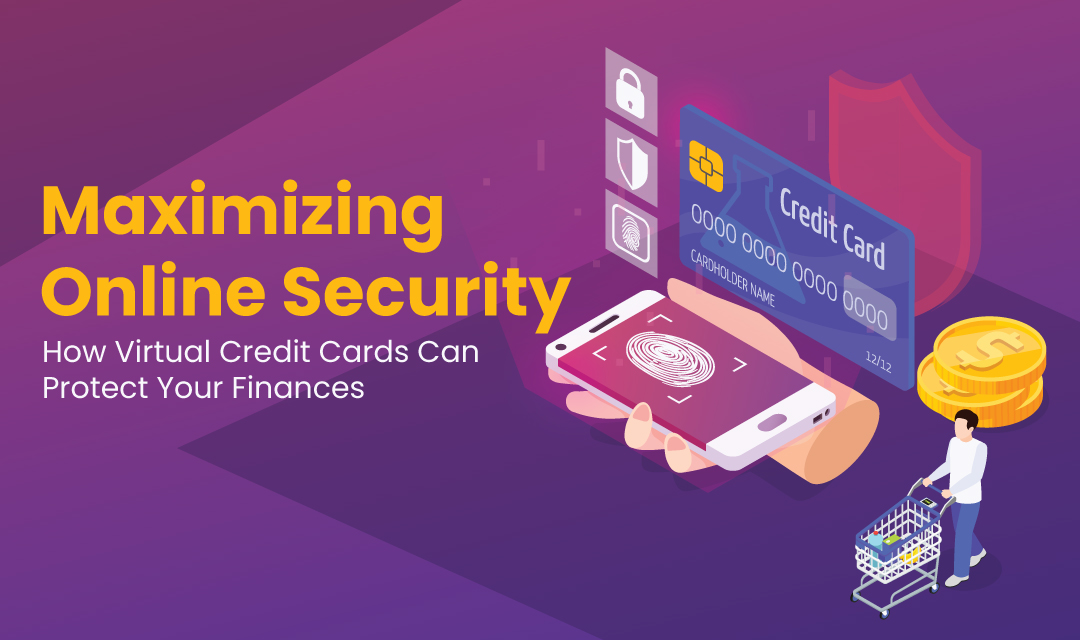
You found an online retailer on Google that offers a fantastic selection of products at attractive prices. While the retailer appears legitimate and has positive reviews, you're unsure about its security measures and the possibility of data breaches. You decided to make a purchase, and as a first-time shopper at this website, you would like to take extra precautions to protect your credit card information.
With the prosperity of the Internet, online transactions have become the norm for everyday purchases and bill payments. However, this convenience comes with potential security risks, as cybercriminals continually find ways to exploit vulnerabilities in the digital payment ecosystem. To safeguard your financial information and protect against fraud, virtual credit cards can be used to protect your physical credit card information. In this article, we'll explore how virtual credit cards can maximize online security, ensuring safe online transactions.
What is Virtual Credit Card?
A virtual credit card is a digital version of your physical credit card that is disposable. Unlike physical cards, they exist solely in the digital realm and don't have a physical presence. When making a purchase, a unique card number is generated for that specific transaction and the virtual number cannot be used anywhere else. This means that even if the card number is compromised, it can't be used for subsequent transactions and safeguard your finances.
Enhanced Security Features
One of the primary benefits of virtual credit cards is their enhanced security features. You may create a virtual credit card number for a particular transaction with a limited validity period ranging from a few hours to several days. Many virtual credit card providers also offer single-use options where the card number becomes invalid after one transaction leaving no trace for potential misuse. This temporary nature ensures that even if a cybercriminal manages to intercept the virtual card details, they won't be able to use them beyond the specific transaction or limited period, further fortifying your financial security.
Safer Online Shopping Experience
Virtual credit cards play a crucial role in safeguarding personal information and protecting against data breaches and identity theft. As they don't reveal your actual credit card number during transactions, they act as a shield for cybercriminals from gaining unauthorized access to your sensitive financial data.
With virtual credit cards, you can confidently make purchases on various websites without worrying about your information falling into the wrong hands. Additionally, these virtual cards help mitigate the risks associated with data breaches on e-commerce platforms and online service providers.
Virtual Credit Cards for Traveling
For frequent travelers, virtual credit cards can be invaluable in ensuring secure transactions abroad. You can set spending limits on virtual cards which can be particularly useful during travel to prevent overspending and minimize the impact of any potential fraudulent activities.
How do you obtain a virtual credit card?
Virtual credit cards are typically issued by banks, financial institutions, or online payment service providers. You may have the option to request a virtual card through your credit card issuer or a third-party payment platform. The following well-known payment platforms and financial institutions offer virtual credit card services:
- Revolut: Revolut is a popular digital banking app that provides virtual credit cards as part of its service. Users can generate virtual cards instantly through the app and use them for online purchases.
- Capital One: Capital One offers virtual credit cards to its customers, allowing them to generate unique card numbers for online transactions.
- Privacy.com: Privacy.com is a service dedicated to providing virtual credit cards. Users can create virtual cards for various purposes, such as single-use cards or merchant-specific cards.
What are the drawbacks of using virtual credit cards?
While virtual credit cards offer enhanced security and convenience for online transactions, they also come with certain disadvantages. Here are some of the key disadvantages of virtual credit cards:
- Virtual credit cards exist solely in the digital realm and do not have a physical card. As a result, you cannot use them for in-person transactions at physical stores, restaurants, or other places that require a physical card.
- Some online subscription services may not be compatible with virtual credit cards, especially those that require automatic recurring payments. Virtual cards with limited validity can lead to subscription interruptions if the card expires before the next billing cycle.
- Since virtual credit cards are often associated with temporary or one-time-use numbers, requesting refunds or resolving disputes for online purchases can be more complicated compared to traditional credit cards.
- Some virtual credit card providers may charge fees for certain services or features, such as card creation, usage, or maintenance. It's essential to review the fee structure of the platform you choose to avoid unexpected costs.
- Some credit card companies offer rewards programs, cashback, or other benefits tied to the use of their physical credit cards. When using a virtual credit card, you may miss out on these rewards and perks associated with your primary credit card.
Conclusion
As online transactions continue to dominate the way we shop and pay bills, protecting our financial information is of paramount importance. Virtual credit cards have emerged as an innovative, effective solution for enhancing online security. With unique card numbers, limited validity periods, and single-use options, virtual credit cards offer robust protection against data breaches, identity theft, and unauthorized transactions.
While there are many benefits of using virtual credit cards, there also exist a few disadvantages. Despite some disadvantages, virtual credit cards remain a valuable tool for enhancing online security and protecting your primary credit card information. By adopting virtual credit cards and following best practices for secure online transactions, you can maximize your financial security and enjoy a worry-free online shopping experience.
Share this post
Leave a comment
All comments are moderated. Spammy and bot submitted comments are deleted. Please submit the comments that are helpful to others, and we'll approve your comments. A comment that includes outbound link will only be approved if the content is relevant to the topic, and has some value to our readers.




Comments (0)
No comment